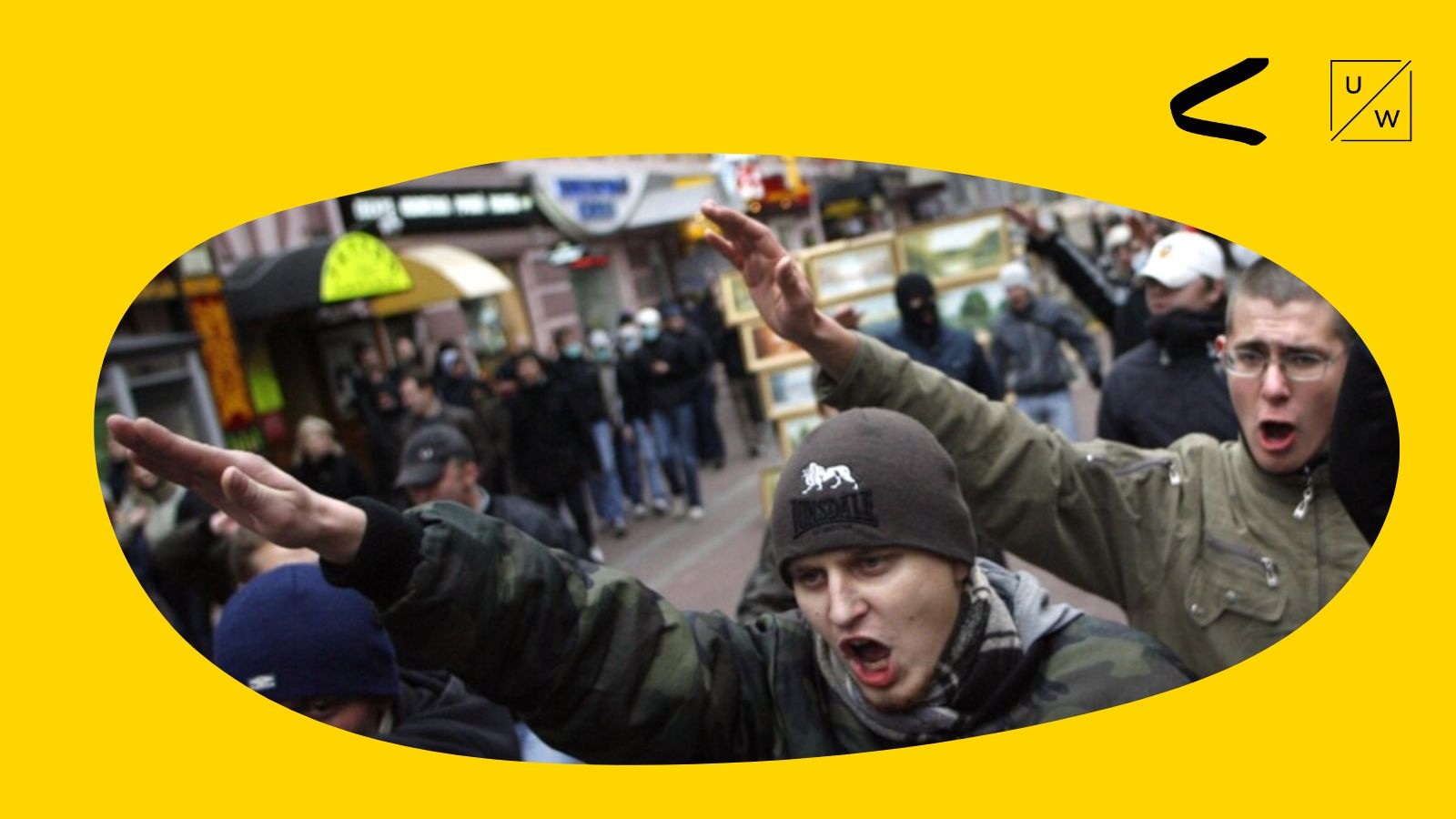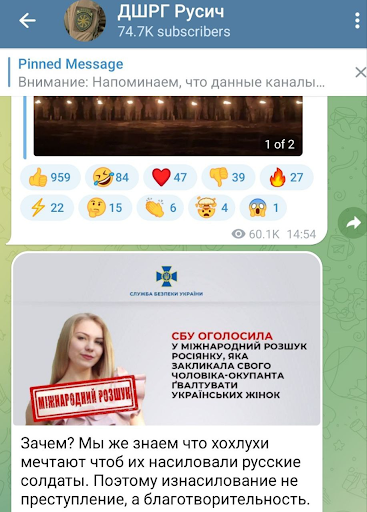
Russian propaganda has chosen to embrace "anti-fascism" as its supposedly guiding principle. This can be seen in slogans "No to fascism," the cult of victory around WWII, resolutions against neo-Nazism at the UN, the repeated accusations of "Nazism" against countries which don't support Russia, even the use of "denazification" as a justification of Russia's current full-scale war against Ukraine. This is, of course, only a ruse. In a rather Orwellian irony, Russia's government has been using various violent neo-Nazi groups within Russia to both suppress civil society and opposition inside Russia and to deploy in combat actions against Ukraine and occupy its territory.
Neo-Nazi trails in the Russia's full-scale war against Ukraine
Among the most visible of Russia's far-right groups are the sabotage assault reconnaissance group Rusich, which has been responsible for savage violence in Ukraine since 2014 and is linked to theWagner mercenary group and Russian Imperial Movement.
"I don't think any Ukrainian nation exists. These are just stupid people who were originally Russians. They have been told for many years that they are a separate nation. Therefore, we need a complex de-Ukraininzation. We have no differences - they have been imposed during the last 100 years... They have to be terrified of us," argued one of Rusich's leaders, Alexey Milchakov, in an interview.
Their members have not only taken part in Russia's invasion of Ukraine and the occupation of its territories, but also in the torture and murder of Ukrainian prisoners of war. In addition to committing violence, Russian neo-Nazis share photos and videos of torture on social media, encouraging others to commit war crimes. These actions have become a strategy both to dehumanise Ukrainians and break Ukrainian resistance and to to recruit new supporters of their effort to exterminate the Ukrainian identity and subjugate Ukrainians to"the Great Russian World."
These groups also take part in purges in occupied territories. They work with occupation forces in persecuting, arresting, and torturing those who remain loyal to Ukraine while under occupation. This activity is also net hidden Rusich justifies their kidnapping, torture, and murder of Ukrainians who refuse to embrace Russian rule by claiming to protect the lives of Russian occupiers.
 Rusich has expressed clearly genocidal intentions towards the people of Ukraine which echoes those of the Nazis and other perpetrators of genocide towards their victims. In a Telegram post speculating on how to “solve the Ukrainian question,” they discuss exterminating Ukrainian children using scientific experiments and forcing those who remain to serve as soldiers or wives of Russian soldiers without any civil or human rights to be given “passports of non-citizens of the Russian Federation”. In particular, they call for Russian soldiers to be “given 2-3 girls each” [aged 10 or below, in addition to “normal wives”] as sexual slaves “to solve the demographic question in Russia.”
Rusich has expressed clearly genocidal intentions towards the people of Ukraine which echoes those of the Nazis and other perpetrators of genocide towards their victims. In a Telegram post speculating on how to “solve the Ukrainian question,” they discuss exterminating Ukrainian children using scientific experiments and forcing those who remain to serve as soldiers or wives of Russian soldiers without any civil or human rights to be given “passports of non-citizens of the Russian Federation”. In particular, they call for Russian soldiers to be “given 2-3 girls each” [aged 10 or below, in addition to “normal wives”] as sexual slaves “to solve the demographic question in Russia.”
 Though this post has been deleted from the main channel, their calls to kill as many Ukrainians, as possible remain visible in other messages shared by Russian neo-Nazis. In particular, members of Rusich deny the criminality of Russian war crimes against Ukrainians and justify sexual violence against Ukrainian women by claiming that "Ukrainian women dream about being raped by Russian soldiers" and that "this rape is not a crime, but an act of charity."
Though this post has been deleted from the main channel, their calls to kill as many Ukrainians, as possible remain visible in other messages shared by Russian neo-Nazis. In particular, members of Rusich deny the criminality of Russian war crimes against Ukrainians and justify sexual violence against Ukrainian women by claiming that "Ukrainian women dream about being raped by Russian soldiers" and that "this rape is not a crime, but an act of charity."
 Rusich makes very clear that it has a Nazi identity in addition to genocidal aims and actions. It uses Nazi and far-right symbols. Russia's use of open Nazis in their genocidal war of conquest against Ukraine makes clear just how absurd their claims of "denazifying" Ukraine are.
Rusich makes very clear that it has a Nazi identity in addition to genocidal aims and actions. It uses Nazi and far-right symbols. Russia's use of open Nazis in their genocidal war of conquest against Ukraine makes clear just how absurd their claims of "denazifying" Ukraine are.
"Russian volunteers in Donbas" - the role of neo-Nazi groups in 2014
Members of these neo-Nazi groups did not hide their ideology during the first outbreak of Russia's war against Ukraine. Rusich's Alexey Milchakov was known for sharing neo-Nazi slogans and photos with Nazi symbols on social media, as well as killing animals. Beginning in 2014, he was involved in armed aggression against Ukraine in Donetsk Oblast, where he posted photos of dead Ukrainian soldiers and encouraged war crimes against Ukrainians
 "I'm a Nazi. I can even throw up my hand [in a "sieg heil" motion]. When you kill a person, you feel the hunter's excitement - those who have never been hunting, try it - and you will have a bit fewer problems..." - he once said in an interview [1.06.51 - 1.07.04].
"I'm a Nazi. I can even throw up my hand [in a "sieg heil" motion]. When you kill a person, you feel the hunter's excitement - those who have never been hunting, try it - and you will have a bit fewer problems..." - he once said in an interview [1.06.51 - 1.07.04].
Milchakov and his comrade Yan Petrovskiy have been sanctioned by Canada, the UK, and the EU. EU authorities have also found cases in which they tried to recruit far-right individuals in EU countries.
The "Russian world" brand of irredentism that was injected into Russia's public discourse in 2014 after the occupation of Crimea and the beginning of hybrid war in Donbas has been sued as a way to mobilise members of Russia's neo-Nazi and far-right groups to join their country's aggression in order to "return historical Russian lands" and fight for "faith, state and the leader."
"Russia for Russians" - The background of Russian neo-Nazism
Neo-Nazi groups in Russia are not a new phenomenon. They have been committing racist, xenophobic, and other hate-motivated crimes in Russia with practically complete impunity since 1990's. They have also been used by the Russian government as a tool to justify various restrictions of human rights and civil freedoms in the country under the guise of "anti-extremism legislation," as well as employed as thugs to attack the opposition using "managed nationalism."
Economic instability, revanchism caused by the collapse of the USSR, Russia's Chechen wars, and the emergence of Putin's authoritarian regime led to the rise of neo-Nazi gangs who committed racist attacks and murders, as well as persecuting and killing opposition activists as "threats to Russia.'' Since 2005, these groups have organized the so-called "Russian March" using imperialist and xenophobic slogans like "Russia for Russians," "Wake up Russia," and "We will make Russia Great Again."
 These groups also have strong opinions on Ukraine, rejecting its independence and calling for the "liberation of historically Russian territories occupied by Ukrainian separatists."
These groups also have strong opinions on Ukraine, rejecting its independence and calling for the "liberation of historically Russian territories occupied by Ukrainian separatists."
In summary, Russia has been using neo-Nazi groups for decades to support the regime and commit crimes against its opponents. Since 2014, these groups have been involved in occupying Ukrainian territories and committing violence against civilians and prisoners of war. These actions are a part of a systemic strategy aimed at erasing Ukrainians as a separate nation and breaking their resistance. Despite claiming to be the world's greatest fighter against Nazis, Russia supports its own neo-Nazis and uses them as a tool in its imperialist, genocidal actions.
